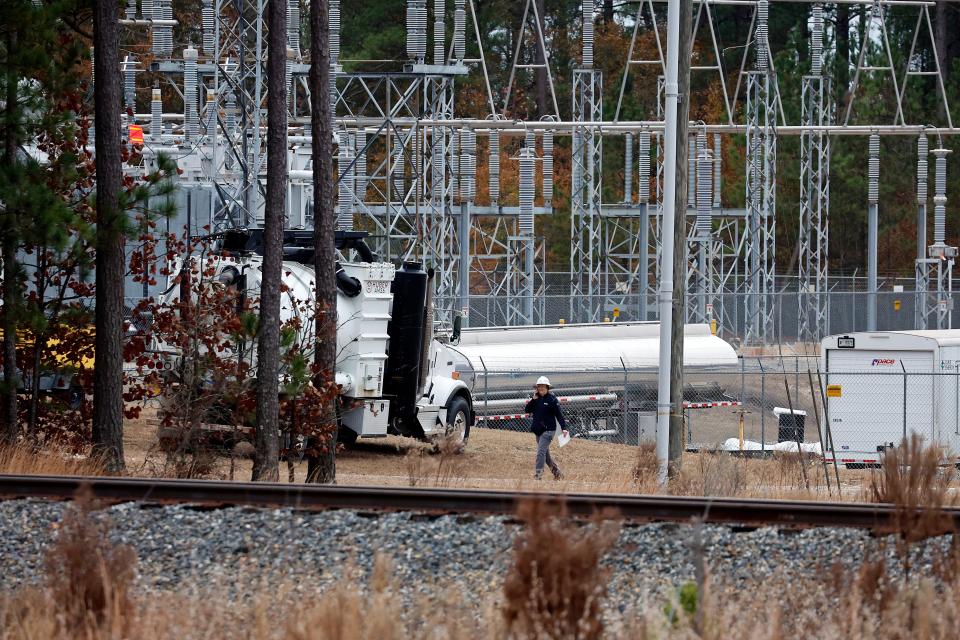Power grid attacks caused outages for thousands. FBI still doesn’t know who did it – or why.
Months since multiple shooting attacks on power substations in three states left thousands of people without electricity, investigators still don't know who targeted the grid – or why.
Now, the FBI is offering a total of $100,000 in rewards for information about four shootings in Washington, Oregon and North Carolina. Steve Bernd, spokesperson for the FBI's Seattle office, said it's the first time his office has offered a reward related to a power substation attack.
"Interfering or tampering with our power grid can have deadly consequences," said Richard Collodi, special agent in charge of the FBI’s Seattle field office. "An attack like this is not just an inconvenience for home and business owners. Think of medical facilities or vulnerable people who depend on electricity for their health."
The call for information comes as concerns grow about increasing attacks on the power grid tied to rising domestic extremism in the U.S.
What happened in the power substation attacks?
Early on Nov. 22, about 5,200 people lost power after someone fired multiple rounds on the Barnes Lake Substation in Tumwater, Washington, according to the FBI. Puget Sound Energy found three 9 mm shell casings and fluid leaking at the scene.
Two days later and about 125 miles south, someone vandalized the Bonneville Power Administration Ostrander Substation in Oregon City, Oregon. Investigators found a hole cut in the perimeter fence and bullet holes in several reactors, the FBI said.

Officials have said it's unclear what motivated the attacks or if they were related. "We announced the rewards and issued the posters jointly to raise visibility of the issue. We are looking at all possibilities at this point," Bernd said.
The next month, someone fired multiple gunshots at two Duke Energy substations located 10 miles apart in Moore County, North Carolina. The Dec. 3 attack caused a "massive" power outage affecting 45,000 customers, with some losing power for as long as five days, the FBI said.
And then on Jan. 17, someone fired on another substation about 40 miles north in Randolph County. Investigators do not believe the North Carolina shootings are connected, according to the Charlotte field office.
The FBI offices field offices in Portland, Seattle and Charlotte are offering up to $25,000 for information on the respective incidents. The Moore County Sheriff’s Office is offering an additional $75,000.
How many substations have been attacked?
Vandalism and suspicious activities at electrical facilities soared nationwide last year, federal data shows. From September through the end of the year, attacks or potential attacks were reported on more than a dozen substations and one power plant across five states.
On Christmas Day, attacks on four substations in Washington left 15,000 people without electricity. Two men were arrested in the incident, and one told police he planned to disrupt power to commit a burglary.
"Attacks on power grid substations have gripped our nation’s attention in recent months because of the devastating threat they pose to our infrastructure," said Kieran Ramsey, special agent in charge of the FBI Portland Field Office, in a statement. "Entire communities – hospitals, schools, and local businesses – might conceivably be incapacitated for many days."
Concerns about domestic extremism
While motives are not yet clear, the attacks come as federal agencies, law enforcement and researchers warn domestic extremists are increasingly targeting the U.S. power grid.
The Department of Homeland Security last year said domestic extremists had been developing credible plans since at least 2020 and would continue to "encourage physical attacks against electrical infrastructure."
Last year, three neo-Nazis pleaded guilty to federal crimes related to a scheme to attack the grid with rifles. The men "wanted to attack regional power substations and expected the damage would lead to economic distress and civil unrest," said Timothy Langan, assistant director of the FBI’s Counterterrorism Division, in a news release.
Last month, federal officials charged a neo-Nazi in Florida and a Maryland woman in a conspiracy to disable the power grid by shooting out substations via sniper attacks in the Baltimore area. Maryland U.S. Attorney Erek Barron said the "hate-fueled attacks" would have threatened lives and left thousands of residents in the cold and dark.
Days later, on Feb. 8, the Department of Homeland Security and FBI issued a joint bulletin warning of racially- or ethnically- motivated violent extremists looking to attack critical infrastructure, including electrical. The warnings prompted several House Democrats to request a briefing from Homeland Security on physical and cyber threats posed by domestic violent extremists to critical infrastructure, particularly the energy sector.
Is a national grid power outage possible?
The grid includes more than 7,300 power plants, 160,000 miles of high-voltage power lines and 55,000 transmission substations.
"The U.S. energy grid really is a grid of grids, and electric companies have strategically invested to ensure there is redundancy and smart technologies to isolate problems," said Scott Aaronson, senior vice president for security and preparedness at the Edison Electric Institute, an association that represents U.S. investor-owned electric companies.
Aaronson said electric companies stock spare equipment and regularly run exercises with government partners. "We are seeing these efforts in action now as companies respond to severe weather from coast-to-coast," he said.
Dig deeper on power grid attacks
'Hate-fueled attacks': Neo-Nazi, woman accused of targeting power stations
Attacks on power substations: Why is the electric grid so hard to protect?
Christmas attacks: 2 arrested in electrical substation attacks in Washington
A 'wake-up call': North Carolina substations attack latest infrastructure threat
Contributing: Dinah Voyles Pulver, USA TODAY

This article originally appeared on USA TODAY: Power outage attack motive unknown as FBI offers reward money

